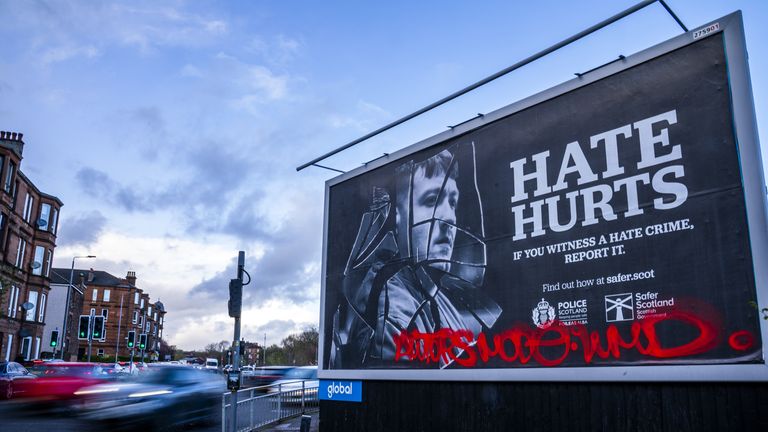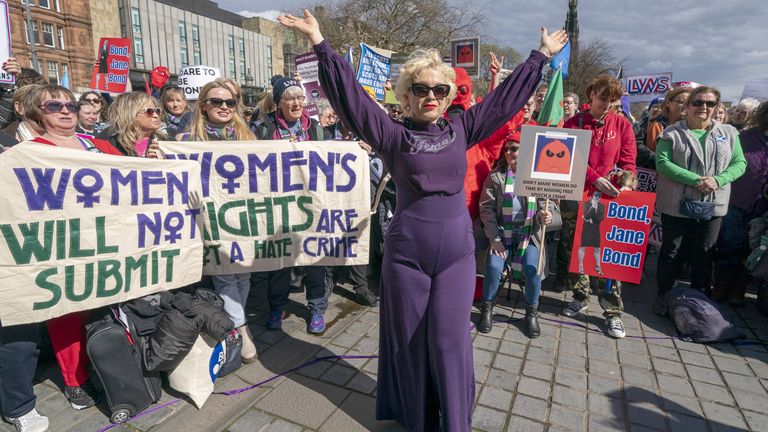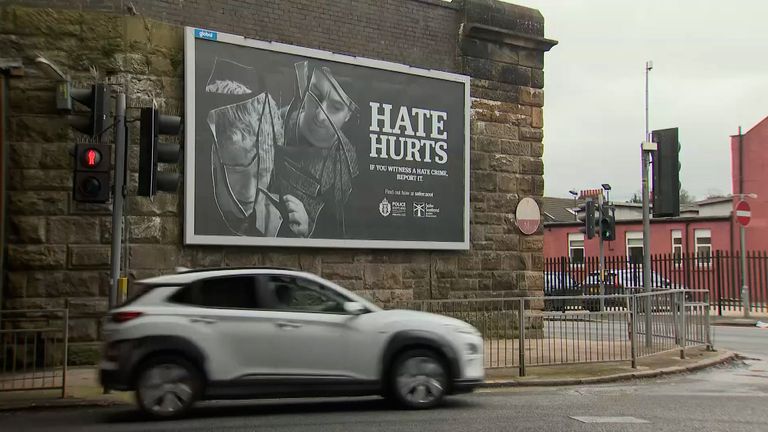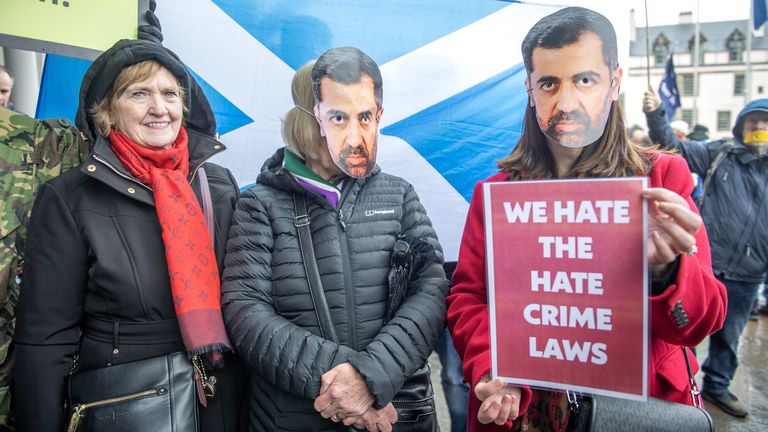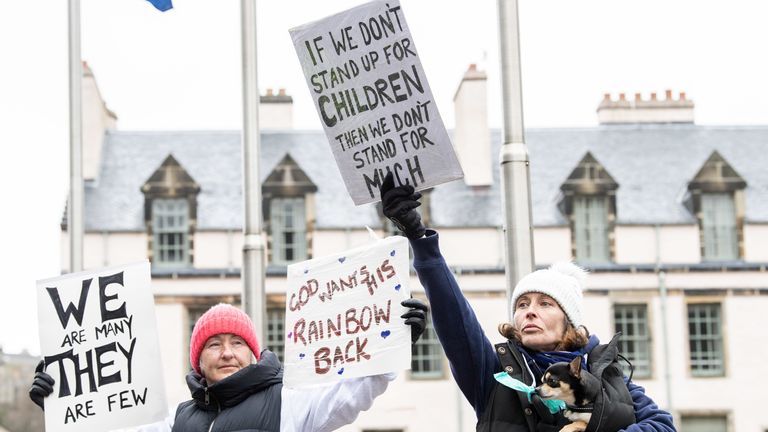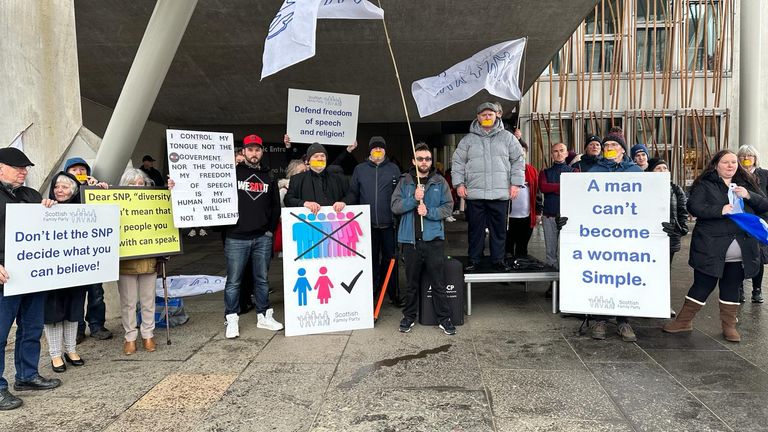Move to repeal Scotland's new hate crime laws fails after Holyrood debate
The Hate Crime and Public Order (Scotland) Act aims to tackle the harm caused by hatred and prejudice but has come under fire from opponents who claim the new laws could stifle free speech.
Wednesday 17 April 2024 18:50, UK
A move to repeal Scotland's new controversial hate crime laws has failed.
The motion lodged by the Scottish Conservatives was voted down following a debate at Holyrood on Wednesday.
Russell Findlay MSP, shadow justice secretary for the Scottish Tories, kickstarted proceedings and said the act had "transformed Scotland into a place of international mockery".
He branded it the "clype's charter" and said it was a "disaster on paper and it's a disaster in reality".
Calling for support from across the chamber, Mr Findlay said: "Some fear being subject to investigation and prosecution for stating the truth about biological sex.
"When JK Rowling put this to the test on social media, Police Scotland confirmed that she had not committed a hate crime.
"But what of those without her cash and clout? Even if prosecutions are unlikely, being subject to investigation can be daunting, disruptive, humiliating and financially costly.
"Police arriving at your home or workplace, taken away in handcuffs, phone seized, forced to pay for a lawyer.
"Stigmatising and damaging to personal reputations and employment prospects.
"And I'm particularly struck by the phrase 'the process is the punishment'. Anyone who's ever taken on Scotland's powerful and unaccountable public bodies will know exactly what this means."
The West Scotland MSP also mocked Police Scotland's "Hate Monster" as he branded the laws "pious, puerile and patronising".
Mr Findlay added: "This is about freedom of speech. It's about bad legislation. It's about letting our police officers do their jobs.
"This is about rejecting division by turning Scot against Scot. To clype on friends, colleagues and family.
"And based on the evidence, we were right to vote against this law three years ago. And based on the evidence, we are right to call for its repeal today."
'Frankly dangerous'
Speaking ahead of the debate, First Minister Humza Yousaf branded the motion as "pure political opportunism" and "frankly dangerous".
Mr Yousaf said he was "pretty confident" it would be rejected.
He added: "If we repealed the hate crime act, we'd have virtually no protection against hatred for people here in Scotland in relation to their race or their religion or their sexual orientation or their disability or their transgender identity.
"So, repealing that would almost give carte blanche to people in Scotland, send a signal to people in Scotland, that minority that indulge in hate, that actually their hatred was acceptable.
"And that's what the Conservatives want to try to bring to the parliament. It's disgraceful. It's dangerous."
What is the law and why is it controversial?
The Hate Crime and Public Order (Scotland) Act came into force on 1 April and aims to tackle the harm caused by hatred and prejudice, extending protections from abusive behaviour to people on grounds including age, disability, religion, sexual orientation and transgender identity.
Scottish Labour backed the legislation when it was passed in 2021, but has criticised the implementation in recent weeks and is now calling for sex to be added to the act.
Read more:
Explained: Scotland's new hate crime law and JK Rowling's issue with it
The legislation does not include sex as a protected characteristic, as a standalone bill designed to tackle misogyny is expected to be put before the Scottish parliament at a later date.
Mr Yousaf has previously said transgender women will be protected under any new misogyny law.
Supporters of the new laws insist they will make Scotland more tolerant.
But opponents of the act, including Harry Potter author JK Rowling, fear it erodes free speech.
Mr Yousaf and justice secretary Angela Constance have both admitted the Scottish government could have done more to communicate to the public what the new laws entail.
Thousands of reports in first weeks
In the first two weeks of the act coming into force, Police Scotland has received almost 9,000 online hate reports.
The complaints dropped from 7,152 in its first week to 1,832 in the second (74.4%).
A total of 453 were recorded as hate crimes and 55 were logged as non-crime hate incidents, meaning they did not meet the threshold for a criminal offence.
Police Scotland said the vast majority of reports received during this period were anonymous, and the complaints continue to be managed within the force's contact centres with "minimal impact on frontline policing".
In a summary released on Tuesday, the force said a total of 84.5% of officers have completed training in regard to the new laws.
Siobhian Brown, minister for victims and community safety, told MSPs that the Scottish government has responded to numerous media statements combating "misinformation" since the laws came into force.
However, when questioned, she did not state what the "misinformation" was.
"We know the impact on those who suffer from hate crime can be traumatic and it can be life-changing, and we want to ensure that we can protect those affected," Ms Brown said.
"But the Conservatives would have this parliament remove those protections.
"Hate crime, as set out under the act, is a behaviour which is both criminal and rooted in prejudice, and where the offender's action has been driven by hatred towards a particular group."
Be the first to get Breaking News
Install the Sky News app for free


Ms Brown called on all those making vexatious complaints to stop doing so.
"We are committed to providing the protection people deserve," she added.
"For those who have faced prejudice due to just who they are due to their race, their disability, religion, sexual orientation, or transgender identity or age, we stand with you, unlike the Conservatives.
"And we will ensure we have laws to protect you. So, let's all stop the gutter politics and the scaremongering and as elected members take responsibility to protect some of our most vulnerable people in our communities."

